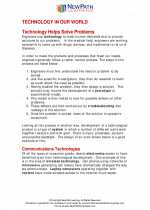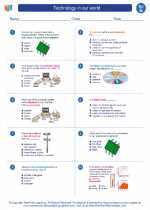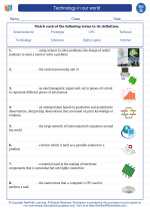Technology in our world -> green technology
Green Technology
Green technology, also known as environmental technology or clean technology, refers to the development and use of products, processes, and systems that conserve natural resources, minimize harm to the environment, and contribute to sustainable development.
Key Concepts
- Renewable Energy: Green technology focuses on harnessing energy from renewable sources such as solar, wind, and hydroelectric power to reduce reliance on fossil fuels and decrease greenhouse gas emissions.
- Energy Efficiency: This involves utilizing technology and practices that reduce energy consumption and waste, such as energy-efficient appliances, LED lighting, and building insulation.
- Waste Management: Green technology aims to minimize waste generation, promote recycling and composting, and develop innovative solutions for the management of waste materials.
- Clean Transportation: This involves the development of electric vehicles, public transportation systems, and fuel-efficient technologies to reduce air pollution and reliance on traditional petroleum-based fuels.
- Sustainable Design: Green technology emphasizes the use of eco-friendly materials, sustainable building practices, and the design of energy-efficient and environmentally responsible structures.
Benefits of Green Technology
Green technology offers a range of environmental, economic, and social benefits, including:
- Reduction of greenhouse gas emissions and air pollution
- Conservation of natural resources
- Creation of green jobs and economic growth
- Improvement of public health and well-being
- Promotion of sustainable development and resilience
Study Guide
To study green technology, it is important to understand the principles and practices associated with renewable energy, energy efficiency, waste management, clean transportation, and sustainable design. Here are some key study tips:
- Research and familiarize yourself with different types of renewable energy sources, their advantages, and limitations.
- Explore case studies and examples of green technology implementation in various industries and sectors.
- Examine the role of government policies and incentives in promoting green technology adoption and investment.
- Learn about the lifecycle assessment of products and processes to evaluate their environmental impact.
- Understand the concepts of carbon footprint, eco-design, and sustainable urban planning.
By mastering these concepts and principles, you will gain a comprehensive understanding of green technology and its role in addressing environmental challenges and promoting sustainable development.





